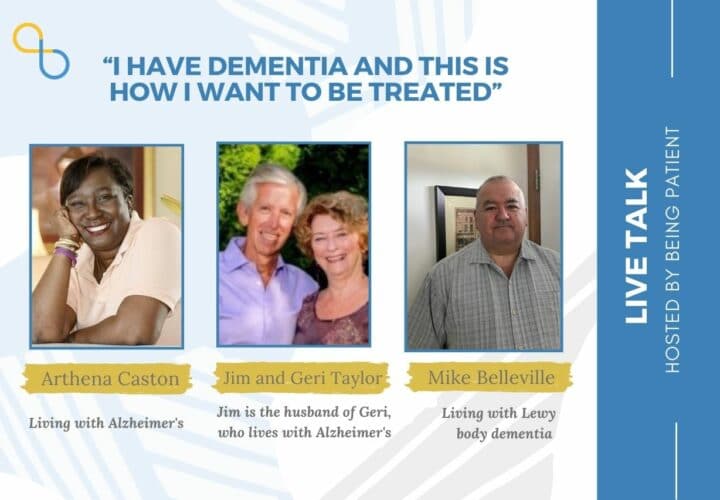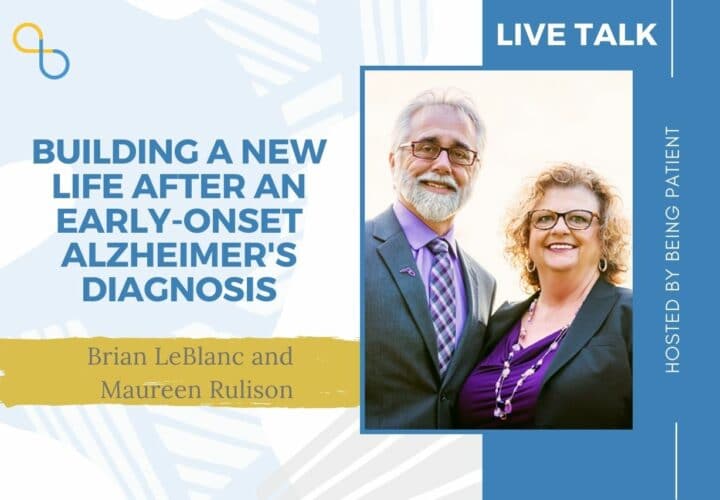How do you talk to a person with dementia?
How do you talk to a person with dementia? Misconceptions about dementia are prevalent, and for people living with the illness, they can make it all the more isolating. After a candid conversation with people living with neurodegeneration, Being Patient takes a closer look at ways to combat stigma, discomfort and discrimination around dementia.
With an Alzheimer’s or dementia diagnosis comes a progression of symptoms including memory loss, decline of motor skills and inability to communicate. But, while some people experience a rapid progression of the disease, many others live for many years before their symptoms grow severe. Mike Belleville, who has Lewy Body dementia, said the hardest thing he’s experienced since his diagnosis is not the symptoms. In fact, it’s the assumptions people make about his mental state after they find out about his condition.
“As soon as you tell someone you have a dementia diagnosis, especially if it’s somebody you haven’t seen for a long time who may not know or even a stranger, their automatic assumption is that you’re in the latter of progression of the disease, that you’re not capable of doing things that you used to do before, that you’re not capable of learning new things,” Belleville told Being Patient in a recent panel discussion among people with dementia diagnoses. “They talk slower to you. Some of them may talk louder to you. It’s just a laundry list of things.”
On the panel, participants agreed that dementia’s symptoms manifest differently and at different paces for every person who experiences it, but one experience many people living with dementia share is that they often contend with these assumptions, discrimination and discomfort from others — including their doctors, loved ones and friends. While it may be unintentional, navigating these reactions and misconceptions from others can have lasting consequences on the diagnosed person’s self-esteem, mental health and quality of life.
“They talk slower to you. Some of them
may talk louder to you. It’s just a
laundry list of things.”
Often, according to Geri Taylor, an Alzheimer’s advocate who was first diagnosed with mild cognitive impairment in 2012, people diminish the person with dementia to such a degree that they hardly engage them in conversation, even if they are the subject matter, she said.
“A couple of years ago I needed to go to the doctor,” Taylor said. “He kept talking to Jim [her husband] … It diminishes your own ability to work yourself.” These encounters show the importance of continuing to engage people with dementia in conversation, instead of only directing dialogue to their loved one.
Meanwhile, Arthena Caston, who was diagnosed with mild cognitive impairment and early-onset Alzheimer’s disease in March 2016 when she was just 51 years old, said she had the same experience: “People that know me know that I’m very outspoken,” Caston said. “The doctors tend to want to speak to my husband and that happened to me before I even got the diagnosis of Alzheimer’s. I just calmly said, ‘But I’m sitting right here. I can hear. I don’t need you to talk to my husband. Talk to me about what you want to say.’ And the doctors’ like, ‘Yeah, but I don’t know if you understand.’”
“Diagnose and adios” — doctors should be mindful of their dementia approach and care
A patient and their family’s need for medical guidance and support begins — not ends — on the day of a dementia diagnosis. But for these individuals, most consultations with doctors provided the contrary to a glimpse of hope; more commonly, they experienced a pessimistic view incorrectly branding dementia as a death sentence.
Caston said she recalled her doctor saying, “I have given you five to eight years to live. Go home and get your house in order.” Even though Caston considered herself a very happy person. But after that, she said, “I came home and was just done.”
Jim Taylor, Geri’s husband, said that even neurologists — who he thought would provide a more enlightened handling of information as opposed to general practitioners — often lack good bedside manner. “Very often it’s ‘diagnose and adios’ because there’s no medication they can give you now that slows or cures or prevents the disease,” Jim explained. “It would help so much if the referring physician could say, ‘Here are resources. Go to the Alzheimer’s Association. Go to your local support group. Here are online resources where you can go and learn about the disease and consider being in a clinical trial.”
People living with dementia feel emotions just like anyone else
While dementia can affect the parts of the brain that control verbal expression, and can affect personality, people still experience emotions, just like anyone else. For those interacting with someone with dementia, be mindful not write off or diminish someone’s feelings — including outbursts or anger — by assuming they are symptoms of the disease.
“Very often it’s ‘diagnose and adios’
because there’s no medication they
can give you now that slows or cures
or prevents the disease.”
After a dementia diagnosis, friendships continue — and they’re more important than ever
People living with dementia maintain friendships — and in fact, friendships are especially important, since staying socially engaged is essential to maintaining cognitive health. Caston has continued to maintain friendships that have spanned over 30 years.
“I am the very same person that you knew before,” she said. “I might be a little slower with some things. I talk a little slow, take a little more time to understand, but I am the same person.” Perhaps because of this, she most enjoys spending time with the group of people with early-stage Alzheimer’s she’s become friends with. “Those are my best friends,” Caston said. “The new friends that I’ve picked up, I’m closer to them than any other group and I love that because they know what I’m going through.”
“The new friends that I’ve picked up,
I’m closer to them than any other group,
and I love that because they know
what I’m going through.”
Belleville has had his share of fair-weather friends. In the beginning stages of his dementia journey, many of his work friends faded away. “Something like that bothered me for a long time, but I’m actually closer with Geri and Jim and Arthena and people that I’ve met online through this journey of ours,” he reflected. “I consider them family. I’m closer with the majority of these folks than I am with some of my own siblings.”
Transcripts edited for clarity.





I cannot sign in to receive your newsletter. I have a Canadian zipcode
Hi Doreen,
You can leave the zipcode blank to receive our newsletter. Thank you!
Thank you very much for this information. My Dad was diagnosed with Alzheimers in 7/2016 and i am realizing I have never really talked to him about the disease from his perspective during the early stages. (I am very sorry, Dad.) Why not, because if it was cancer or diabetes, etc. we sure would have? i am looking forward-instead of back-to reading more articles from persons with dementia to better relate to where my dad is now in middle stage Alz.